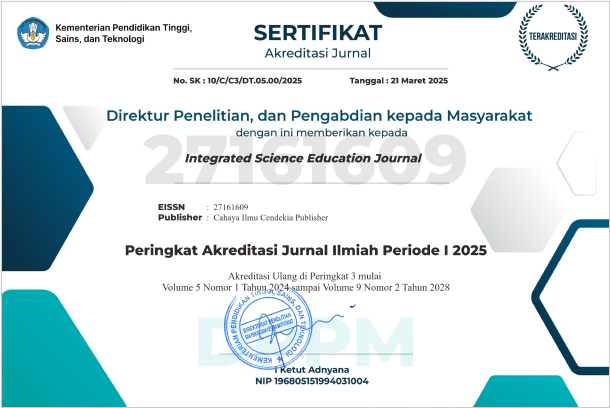Diskaprod: Dissemination and Creation of Basic Process Skills Assessment Instruments in Science Learning
Abstract
Purpose of the Study: This research aimed to identify and analyze the outcomes of the DISKAPROD program, specifically focusing on assessing the effectiveness and quality of instruments used to measure students' basic process skills in schools. The study also sought to determine teacher perceptions regarding the program's impact on improving student learning outcomes.
Methodology: A descriptive quantitative method was applied. The study population consisted of all teachers at the Al-Hidayah Foundation Kebon IX Muaro Jambi, with 21 teachers selected via purposive sampling. Data collection was conducted using questionnaires and interviews, while data analysis involved descriptive statistical tests to evaluate the teachers’ perceptions and responses to the program.
Main Findings: The findings revealed strong teacher support for the DISKAPROD program. A significant 57.1% of the teachers expressed agreement with its implementation, and 76.1% provided a positive response to the program’s impact. These results suggest widespread approval and recognition of the program’s effectiveness in enhancing the measurement of student process skills, indicating the potential for broader adoption.
Novelty/Originality of this Study: This study introduces a fresh approach by highlighting the critical role of teacher-developed assessment tools in accurately measuring student learning outcomes. The integration of the DISKAPROD program into the curriculum is presented as a novel and effective method for improving science education, particularly at the Mts level. By emphasizing the practical application of assessment instruments, this research contributes to ongoing efforts to refine educational practices and foster student skill development in scientific inquiry.
References
M. Arif, “Pengembangan instrumen penilaian melalui pendekatan keterampilan proses sains sd/mi [Development of assessment instruments through the elementary school science process skills approach],” Ta,allum J, vol. 4, no. 1, pp. 123–148, 2016.
D. Kurniawan, D. Kuswandi, and A. Husna, “Pengembangan media video pembelajaran pada mata pelajaran ipa tentang sifat dan perubahan wujud benda kelas iv sdn Merjosari 5 Malang [Development of learning video media in science subjects about the properties and changes in the state of objects for class IV SDN Merjosari 5 Malang],” JINOTEP (Jurnal Inov. dan Teknol. Pembelajaran) Kaji. dan Ris. dalam Teknol. Pembelajaran, vol. 4, no. 2, pp. 119–125, 2018, doi: 10.17977/um031v4i22018p119.
F. O. Rosa, “Pengembangan modul pembelajaran ipa smp pada materi tekanan berbasis keterampilan proses sains [Development of junior high school science learning modules on pressure material based on science process skills],” J. Pendidik. Fis, vol. 3, no. 1, 2015, doi: 10.24127/jpf.v3i1.21.
A. Madjid, “Kompetensi profesional guru: Keterampilan dasar mengajar [Teacher professional competence: Basic teaching skills],” J. Peqguruang Conf. Ser, vol. 1, no. 2, pp. 1–8, 2019.
H. Putri, D. Susiani, N. S. Wandani, and F. A. Putri, “Instrumen penilaian hasil pembelajaran kognitif pada tes uraian dan tes objektif [Cognitive learning outcome assessment instruments in descriptive tests and objective tests],” J. Papeda J. Publ. Pendidik. Dasar, vol. 4, no. 2, pp. 139–148, 2022, doi: 10.36232/jurnalpendidikandasar.v4i2.2649.
S. L Jannah, M. R. Ansori, and R. H. Harianto, “Meningkatkan keterampilan proses sains siswa melalui lkpd berbasis scientific approach pada kelas v mi islamiyah Ambat Pamekasan [Improving students' science process skills through scientific approach-based worksheets in class V of MI Islamiyah Ambat Pamekasan],” JEMARI (Jurnal Edukasi Madrasah Ibtidaiyah), vol. 6, no. 1, pp. 1–9, 2024, doi: 10.30599/jemari.v6i1.2805.
M. D. W. Ernawati, H. Haryanto, H. Harizon, Y. Yusnidar, N. N. Qoidah, and M. Udhiyah, “Analysis of teacher response to problem based learning model and scaffolding model in science subjects”, In. Sci. Ed. J, vol. 4, no. 3, pp. 123-127, 2023, doi: 10.37251/isej.v4i3.733.
S. Rahmawati and K. Nurachadija, “Inovasi pendidikan dalam meningkatkan strategi mutu pendidikan [Educational innovation in improving educational quality strategies],” BERSATU J. Pendidik. Bhinneka Tunggal Ika, vol. 1, no. 5, pp. 1–12, 2023, doi: 10.51903/bersatu.v1i5.303
D. W. S. Rahadiyani, P. A. Rivani, and F. Untari, “Implementation of problem based learning model as an effort to improve student activities and outcomes in temperature and heat materials”, In. Sci. Ed. J, vol. 4, no. 1, pp. 19-22, 2023, doi: 10.37251/isej.v4i1.292.
M. Yusuf, “Evaluasi metode penilaian dalam pendidikan islam dalam upaya meningkatkan ketepatan dan objektivitas penilaian siswa [Evaluation of assessment methods in Islamic education in an effort to improve the accuracy and objectivity of student assessment],” Sasana J. Pendidik. Agama Islam, vol. 2, no. 1, pp. 92–97, 2023, doi: 10.56854/sasana.v2i1.218.
V. London Pare and A. Wainsaf, “Strategi assesmen pelaksanaan praktikum ilmu pengetahuan alam di laboratorium [Assessment strategies for the implementation of natural science practicums in the laboratory],” SEARCH Sci. Educ. Res. J, vol. 1, no. 2, pp. 43–57, 2023, doi: 10.47945/search.v1i2.1251.
K. A. Imania and S. K. Bariah, “Rancangan pengembangan instrumen penilaian pembelajaran berbasis daring [Design for developing online learning assessment instruments],” J. Petik, vol. 5, no. 1, pp. 31–47, 2019, doi: 10.31980/jpetik.v5i1.445.
S. Sodikin and S. Gumiandari, “Analisis SWOT mutu evaluasi pembelajaran [SWOT analysis of learning evaluation quality],” JDMP (Jurnal Din. Manaj. Pendidikan), vol. 6, no. 1, 2022, doi: 10.26740/jdmp.v6n1.p59-69.
Ardiansyah, Risnita, and M. S. Jailani, “Teknik pengumpulan data dan instrumen penelitian ilmiah pendidikan pada pendekatan kualitatif dan kuantitatif [Data collection techniques and instruments for scientific educational research using qualitative and quantitative approaches],” J. IHSAN J. Pendidik. Islam, vol. 1, no. 2, pp. 1–9, 2023, doi: 10.61104/ihsan.v1i2.57.
M. Firmansyah, M. Masrun, and I. D. K. Yudha S, “Esensi perbedaan metode kualitatif dan kuantitatif [The essence of the differences between qualitative and quantitative methods],” Elastisitas - J. Ekon. Pembang, vol. 3, no. 2, pp. 156–159, 2021, doi: 10.29303/e-jep.v3i2.46.
S. Musianto, L, “Perbedaan pendekatan kuantitatif dengan pendekatan kualitatif dalam metode penelitian [The difference between quantitative and qualitative approaches in research methods],” J. Manaj. Dan Wirausaha, vol. 4, no. 2, pp. 123–136, 2002.
R. Rusandi and M. Rusli, “Merancang penelitian kualitatif dasar/deskriptif dan studi kasus [Designing basic/descriptive qualitative research and case studies],” Al-Ubudiyah J. Pendidik. Dan Stud. Islam, vol. 2, no. 1, pp. 48–60, 2021, doi: doi.org/10.55623/au.v2i1.18.
D. Firmansyah and Dede, “Teknik pengambilan sampel umum dalam metodologi penelitian: Literature review [Common sampling techniques in research methodology: Literature review],” J. Ilm. Pendidik. Holistik, vol. 1, no. 2, pp. 85–114, 2022, doi: 10.55927/jiph.v1i2.937.
P. Azora, “Analisis quick count dengan menggunakan metode stratified random sampling studi kasus pemilu gubernur Kalimantan Barat 2018 [Quick count analysis using the stratified random sampling method, a case study of the 2018 West Kalimantan gubernatorial election],” Bimaster Bul. Ilm. Mat. Stat. Dan Ter, vol. 10, no. 1, pp. 43–50, 2021, doi: 10.26418/bbimst.v10i1.44666.
F. Maujud, “Peran partisipasi masyarakat dalam meningkatkan mutu pendidikan madrasah (Studi Kasus di Madrasah Ibtidaiyah Islahul Muta.allim Pagutan Kota Mataram) [The role of community participation in improving the quality of madrasah education (Case Study at the Islahul Muta.allim Pagutan Elementary Madrasah, Mataram City)],” Palapa J. Stud. Keislam. dan Ilmu Pendidik, vol. 5, no. 2, pp. 92–121, 2017.
S. Rosalina, U. Mohammad, and D. Fadli, “Strategi Pembinaan Karyawan PT Metropolitan Karawang,” Triwikrama J. Ilmu Sos., vol. 4, no. 1–12, 2024.
M. Mulyadi, “Riset desain dalam metodologi penelitian [Design research in research methodology],” J. Stud. Komun. dan Media, vol. 16, no. 1, p. 71, 2013, doi: 10.31445/jskm.2012.160106.
M. Mulyati, F. I. Putri, and D. Deswalman, “Efforts to Improve Student Activities and Outcomes in Physics Learning Using the Two Stay Two Stray Technical Cooperative Learning Model at Senior High School”, In. Sci. Ed. J, vol. 4, no. 1, pp. 30-35, 2023, doi: 10.37251/isej.v4i1.294.
M. Suluh and J. Jumadi, “Persepsi guru dan peserta didik terhadap proses pembelajaran fisika berdasarkan kurikulum 2013 [Teacher and student perceptions of the physics learning process based on the 2013 curriculum],” J. Penelit. dan Pengkaj. Ilmu Pendidik. e-Saintika, vol. 2, no. 2, p. 62, 2019, doi: 10.36312/e-saintika.v2i2.10.
Y. Yusnidar, E. Epinur, and N. A. Nadila, “Analysis of student responses to student worksheets based on project based learning models”, In. Sci. Ed. J, vol. 4, no. 3, pp. 111-116, 2023, doi: 10.37251/isej.v4i3.718.
A. Sholikhah, “Statistik deskriptif dalam penelitian kualitatif [Descriptive statistics in qualitative research],” KOMUNIKA J. Dakwah dan Komun, vol. 10, no. 2, pp. 342–362, 2016, doi: 10.24090/komunika.v10i2.953.
A. Elvanisi, S. Hidayat, and E. N. Fadillah, “Analisis keterampilan proses sains siswa sekolah menengah atas [Analysis of high school students' science process skills],” J. Inov. Pendidik. IPA, vol. 4, no. 2, pp. 245–252, 2018, doi: 10.21831/jipi.v4i2.21426.
H. Siswono, “Analisis pengaruh keterampilan proses sains terhadap penguasaan konsep fisika siswa [Analysis of the influence of science process skills on students' mastery of physics concepts],” Momentum Phys. Educ. J, vol. 1, no. 2, p. 83, 2017, doi: 10.21067/mpej.v1i2.1967.
J. L. Montiel Olea and M. Plagborg-Møller, “Local projection inference is simpler and more robust than you think,” Econometrica, vol. 89, no. 4, pp. 1789–1823, 2021, doi: 10.3982/ecta18756.
C. Jones and J. R. Venable, “Theory-Based problem formulation and ideation in mhealth: Analysis and recommendations,” J. Organ. End User Comput, vol. 34, no. 4, pp. 1–21, 2021, doi: 10.4018/joeuc.289434
Copyright (c) 2024 Darmaji Darmaji, Astalini Astalini, Dwi Agus Kurniawan, Yusnidar Yusnidar, Harizon Harizon, Sarah Pramitha, Raden Muhammad Afrialdi

This work is licensed under a Creative Commons Attribution 4.0 International License.
Authors who publish with this journal agree to the following terms:
- Authors retain copyright and acknowledge that the Integrated Science Education Journal is the first publisher licensed under a Creative Commons Attribution 4.0 International License.
- Authors are able to enter into separate, additional contractual arrangements for the non-exclusive distribution of the journal's published version of the work (e.g., post it to an institutional repository or publish it in a book), with an acknowledgment of its initial publication in this journal.
- Authors are permitted and encouraged to post their work online (e.g., in institutional repositories or on their website) prior to and during the submission process, as it can lead to productive exchanges and earlier and greater citation of published work.







.png)
.png)






